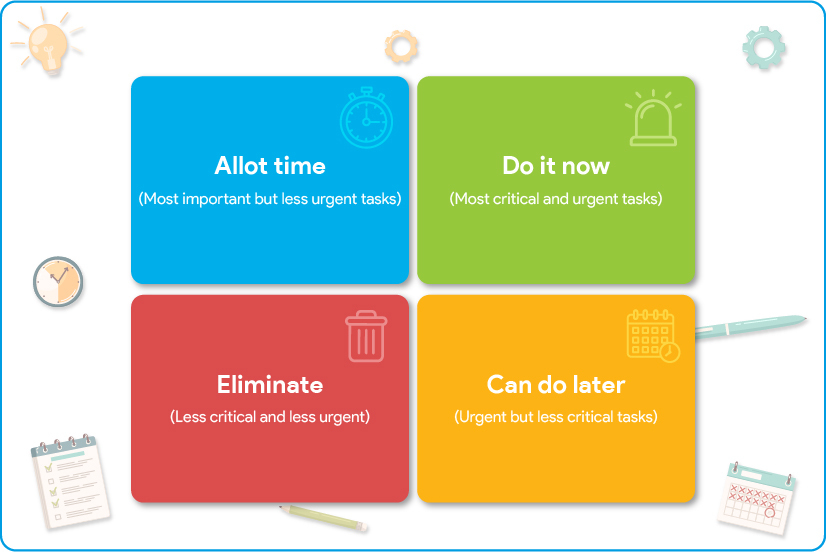Top 10 Tips and Tools To Ace All Your Exams

If you’re a student traversing the path of exam preparation then the words, “There’s so little time and so much to do,” have a special place in your heart and mind. And, your best friends are textbooks that you must memorise cover to cover. Along with cups of coffee that you think sustains you.
Time, at this point, does not appear to be your best friend. Instead, it feels like it’s travelling at the speed of light and leaving you behind amidst unsolved questions and stacks of books. It does not help that often board exams and competitive entrance tests are scheduled around the same time.
As a result, preparing for exams such as JEE, NEET alongside your board exams may seem like moving a mountain. Especially, because it’s crucial that you clear the boards and competitive exams to pursue your dream career.
The preparation process can be challenging but not impossible when you know how to manage your time for studies. It’s fairly simple, all you have to do is use productivity techniques for time management. Also, Learning how to overcome exam fear helps in improving your overall performance.
What’s more? We have 10 tips that will help you ace all of your exams.
A popular productivity technique, where you begin a task by setting your timer to 25 or 50 minutes. This is called one Pomodoro. Then, you start studying a topic or solving a problem for the said time. Once you complete your task, you take a break for 5 or 10 minutes respectively. You then resume your task by setting the timer again. After three Pomodoros, you take a longer break of 20 or 40 minutes. This technique will keep you focussed and teach you how to manage time effectively.
2. Eisenhower box
If the question, how to crack JEE and NEET exams along with boards keeps you up at night, then it’s time to prioritise. The best way to do that is by drafting an Eisenhower box and organising your tasks in the order of priority.
In the top left square of the matrix, add tasks that are important but less urgent. In other words, you allot time for important activities that aid your exam preparation. For example, you can solve PYQs for JEE or NEET between 2 PM and 4 PM.
In the top right square, add tasks that are urgent and critical. These are activities that you need to get done immediately. For example, viewing video lessons between 9 AM and 11 AM on important JEE and NEET 2022 topics.
Next, in the bottom right square, add tasks that are important but can be completed later, for example, revising the theoretical concepts for board exams between 5 PM and 8 PM.
Finally, in the bottom left square, add tasks that can be eliminated. For example, reading up on topics that are outside the exam syllabus.

3. Deep work
If you don’t like multitasking then deep work is your go-to tool. Here, you pick one activity that you need to complete, within a certain time frame. This is technique will surely help you manage your time for studies. Then, you dedicate two to four hours of your time to finishing that activity. Ensure that you focus completely on the task at hand without any distractions. Experts say that to achieve this, you need to organise your day like a skyscraper. For example, devote a chunk of time to completing tasks such as watching video lessons to understand JEE and NEET concepts better, and another chunk to solving daily practice problems on the same topics later.
4. Eat the frog
If you’re a student with a tendency to procrastinate, then this method is for you. All you have to do is make a list of tasks you need to accomplish. Then pick the hardest one and try to finish it first thing in the morning. Do this consistently and soon you will seamlessly finish all your tasks on time. For instance, if you have a tendency to avoid a particular boring topic, then you can start by taking it up first thing in the morning. Keep at it till you cover a significant amount of the syllabus and repeat the same next day. This productivity tool might just be the answer to the question, how to crack JEE and NEET exams?
5. Pareto principle
If you aspire to work smart and get good results, then the Pareto principle will be your favourite productivity tool. It helps in clearing the clutter in your to-do lists and increases focus. How this works is, if you have a list of five jobs that you need to complete, then you must choose the top two things that are critical and will have the most impact on your day. For example, the first two tasks can be studying a chunk of difficult topics in a subject in the morning, and then practising numerical problems in the afternoon.
6. Ivy Lee method
This technique is ideal for you if you like being proactive. Here, at the end of your day, you note down a list of six important tasks you need to complete the next day. Ensure that you write no more than six actions. The next day, finish all six in the same order of priority, while tackling one task at a time. For example, the first two items on your list can be revising a NEET exam topic and taking a mock test.
7. Find your golden hour
Another trick to improve productivity is to find and utilise your “golden hour.” It is the time when you’re most motivated to take action. This time could be early morning, late afternoon, or anytime you are alert and focused on work. You can choose to complete tasks that are challenging and require focus during this time.
8. Social media detox
This is a handy tip that plays a crucial part in enhancing productivity and saving time. Here you limit your social media time by deleting apps that distract you. If you are unable to uninstall your social media apps, then you can turn on the aeroplane mode whilst studying for JEE, NEET, or board exams to minimise distractions.
9. Take breaks
An adequate amount of breaks while preparing for competitive and board exams is vital. This will help you focus better and give your mind some rest. What’s more? You will bounce back stronger to tackle all the exams on your plate.
10 Track your progress
Finally, the most important step in your preparation is tracking your progress. Ensure that you maintain a journal or a tracker to keep a record of all the chapters you’ve covered in the JEE, NEET, and board exam syllabus. This will help you identify anything that you may have missed while studying.
Learn how to prepare for entrance exams like JEE and NEET. While we know that there is no one-size-fits-all approach to being productive, any one of the aforementioned pointers can help you manage time for JEE preparation. Armed with these tools and tips, you will be on track with your studies for JEE, NEET, as well as board exams.